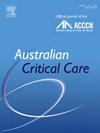Bereaved family members’ perspectives of their organ donation decision at 3 months post death of the donor-eligible patient in critical care: A dual-method study
IF 2.6
3区 医学
Q2 CRITICAL CARE MEDICINE
引用次数: 0
Abstract
Background
Offering organ donation is part of routine end-of-life care in critical care. Families describe feeling emotionally overwhelmed, which reduces their ability to understand complex medical information necessary to make informed decisions about organ donation. Late decisional regret is more common among families who decline donation. Thus, it is vital to investigate whether the organ donation decision choices that families make in hospital endure unchanged and what factors affect their perspectives.
Objectives
The objective of this study was to explore family members’ perspectives of their final organ donation decision in hospital, either to consent or to decline donation, at around 90 d later.
Methods
This dual-method study comprised semistructured interviews of family members of donor-eligible patients who experienced care in seven metropolitan teaching hospitals, a tertiary paediatric hospital, and a major regional hospital in New South Wales, Australia. Interviews were audio recorded and transcribed verbatim. Descriptive quantitative analysis and thematic analysis were used.
Findings
Participants overwhelmingly agreed that their organ donation decision remained unchanged at 3 months after the death of their relative (n = 127, 97%). The remainder (n = 3, 2%) were unsure or stated “possibly not” (n = 1, 1%); in these cases, the eligible donor was certified dead via circulatory criteria. Five themes were synthesised in relation to the organ donation decision: Knowledge of the donor-eligible patient's prior wishes, Family members' prior decision to donate their own organs, Solace in the decision, Altruism, and Reality of the process.
Conclusions
The organ donation decision choice remained unchanged for the large majority. Further research is required to ascertain how people can be assisted to understand the organ donation process, particularly in the setting of certification of death by circulatory criteria, and how best to positively influence consent rates.
Clinical trial registry number
Australian and New Zealand Clinical Trial Registration ACTRN12613000815763.
符合捐献条件的危重病人去世 3 个月后,其遗属对其器官捐献决定的看法:双重方法研究。
背景:提供器官捐赠是重症监护中常规临终关怀的一部分。据家属描述,他们在情绪上感到不知所措,这降低了他们理解复杂医疗信息的能力,而这些信息是就器官捐献做出知情决定所必需的。在拒绝捐献的家庭中,晚期决定后悔的情况更为常见。因此,调查家属在医院做出的器官捐献决定选择是否会持续不变以及哪些因素会影响他们的观点至关重要:本研究的目的是探讨90 d左右后家属对其在医院做出的最终器官捐献决定(同意捐献或拒绝捐献)的看法:这项双重方法研究包括对澳大利亚新南威尔士州七家大都市教学医院、一家三级儿科医院和一家大型地区医院中符合捐献条件的患者家属进行半结构化访谈。对访谈进行了录音和逐字记录。采用描述性定量分析和主题分析:绝大多数参与者同意,在亲属去世 3 个月后,他们的器官捐赠决定保持不变(127 人,97%)。其余参与者(n = 3,2%)不确定或表示 "可能不会"(n = 1,1%);在这些情况下,符合条件的捐献者通过循环标准被证明死亡。与器官捐献决定有关的五个主题被综合在一起:对符合捐献条件的病人先前意愿的了解、家庭成员先前决定捐献自己的器官、对决定的安慰、利他精神和过程的现实性:大多数人的器官捐献决定选择保持不变。需要开展进一步研究,以确定如何帮助人们了解器官捐献过程,尤其是在根据循环标准进行死亡认证的情况下,以及如何最好地对同意率产生积极影响:澳大利亚和新西兰临床试验注册 ACTRN12613000815763。
本文章由计算机程序翻译,如有差异,请以英文原文为准。
求助全文
约1分钟内获得全文
求助全文
来源期刊

Australian Critical Care
NURSING-NURSING
CiteScore
4.90
自引率
9.10%
发文量
148
审稿时长
>12 weeks
期刊介绍:
Australian Critical Care is the official journal of the Australian College of Critical Care Nurses (ACCCN). It is a bi-monthly peer-reviewed journal, providing clinically relevant research, reviews and articles of interest to the critical care community. Australian Critical Care publishes peer-reviewed scholarly papers that report research findings, research-based reviews, discussion papers and commentaries which are of interest to an international readership of critical care practitioners, educators, administrators and researchers. Interprofessional articles are welcomed.
 求助内容:
求助内容: 应助结果提醒方式:
应助结果提醒方式:


